social bookmarking tools:
 |
|
| Available RSS Feeds |
|---|
 - Top Picks - Top Picks |
 - Today's Music - Today's Music |
 - Editor's Blog - Editor's Blog
|
 - Articles - Articles
|
Add Louisville Music News' RSS Feed to Your Yahoo!
|
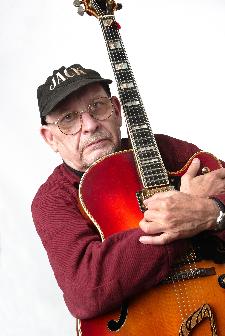
Jack Brengle:
Louisville's most grateful jazz son
Intensity grows in Jack Brengle's eyes when the subject of Louisville comes up. Even though he's an Indianapolis native, Louisville feels like his hometown. For a man who has traveled all over the United States, spent significant time bouncing around the jazz scenes of Chicago and New York, and played alongside the likes of Jimmy Raney, Coleman Hawkins, Clark Terry and Buddy Rich, that's a high compliment indeed.
"It's an amazing town," Brengle, one of Louisville's most accomplished jazz musicians, said. "I love this town - which is why I'm here right now."
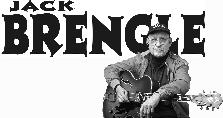
Brengle recently moved to Noblesville, Ind., to be closer to his family, but a big part of his heart remains in the River City - as do many of his friends. He was in Louisville recently to visit some of those friends - not to mention to perform with the Roger Dane Orchestra at the Comedy Caravan and sit in with his friend Ray Johnson's combo at Jack Fry's. It may be his last visit for a while, so it's fitting that he also spent time talking about the city, jazz and his career while he was here.

"There are a ton of marvelous musicians in this town," he said, citing the likes of Dane, Johnson, Tyrone Wheeler, Darryl Cotton, John Topy, Scott Henderson, Bruce Morrow, Todd Hildreth, Jamey Aebersold - well, far too many to list them all. He noted that many have left town to pursue careers, succeeded, and ultimately returned. And that Louisville still teems with talented jazz players of all kinds. Is there some kind of special jazz sauce in the water?
"It's unbelievable sometimes," he said. "Damned if I know."
He does know why he returned to Louisville for good many years ago - playing constantly in what he calls "the joints" eventually became more than Brengle cared to handle.
"Playing six nights a week was finally beginning to get to me," said Brengle, 66, as he smoked a New York 100 and sipped on a draft beer. "Every night I was beginning to think, 'here we go again.'" So it was that in the mid-1970s Brengle returned to Louisville. After a few more years of almost nightly gigs, he began teaching guitar and "jobbing" around town - playing a couple nights a week instead of six.
A lot happened between his first urge to pick up a guitar and his decision to cool off, however. And even if he doesn't intend to return to that former life, he certainly seems to enjoy discussing it.
The Making Of A Jazz Guitarist

Brengle began playing guitar early, although the jazz part came later. He gained a lot of his experience playing in his high school band in Indy - "I got conned into playing Hawaiian guitar," he said.
But his band director was an excellent mentor, giving Brengle the freedom to try out different styles and helping him to read music. When Brengle graduated in 1953, he immediately got a job touring with country legend Pee Week King's band.
Yes, country. It paid the bills. But it also would indirectly lead him to his first love: jazz.
"We went to New York to do a show at NBC, the Perry Como Show," he said. "They had a huge orchestra. I started going to jazz joints - I was fascinated with it."
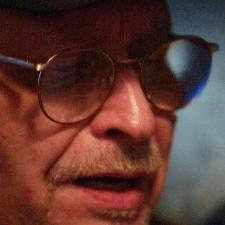
After testing out some of the jazz clubs in Chicago - home of Charlie Parker and Blue Note Records - he was hooked. He went back to Indianapolis after the Pee Wee King tour ended and played briefly with a rock 'n' roll band. And then he was drafted. After serving in the Korean War, he was ready to launch his jazz career - and the first gig he got was a three-month tour playing guitar for Gene Autry's band.
"By that time, I'd given up any hope" of being a jazz guitarist. "I thought, 'This is going to keep me in country and Hawaiian.' But I had just enough jazz knowledge to be dangerous."
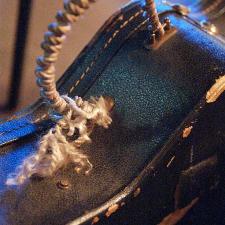
He came to Louisville in 1959, where he met jazz pianist Don Murray. Murray became Brengle's mentor. He taught Brengle to write music and to read it more accurately. In order to join Murray's band, Brengle agreed to switch over to playing bass.
"Trust me," he said, "it was a dare."
But he learned to play the standup bass and found he was a natural. "I got hooked on the bass and played it for several years. I was very much into the jazz scene and probably got to play with a lot of guys I wouldn't have gotten to play with as a guitarist," Brengle said.
One of these was Buddy Rich, and the experience was, Brengle said, "was to my chagrin."
"No one could play like he could," Brengle said, "but he was insane." He didn't elaborate. But Rich has long been rumored to be something of a perfectionist.
John LaBarbera, however, another veteran of Buddy Rich's band and one of Louisville's best-known jazz musicians, commented recently in the Louisville Jazz Society newsletter on the so-called "scream tape" now circulating on the Internet - in which Rich harshly berates several of his players. In that column, he shared the story of one of his experiences with Rich. It seems Rich's band was touring with Tony Bennett in the late 1960s, and during one particularly intense show in Birmingham, Rich actually blew his signature drum break. Everyone went silent for just a moment. The band picked it right back up, and Rich nailed the break the second time around to the delight of the audience. Years later, LaBarbera asked Rich if he had blown it on purpose the first time for the showmanship value. "What came next," LaBarbera wrote, "was probably the most intense 'lecture' I ever received from him." In reference to the scream tape, LaBarbera wrote, "these kids got off easy, to say the least."
By 1965, even with his travels, Brengle was pretty ingrained in the Louisville jazz scene. It was then that he met Dick Sisto, another musician who remains a Louisville jazz mainstay even today. Then in 1966, Brengle befriended Raney, who already had worked with Eddie Harris and Stan Getz. Brengle and Raney would become best friends.
"We would hang out or play music together or just shoot the bull and listen to records," Brengle said of his friend. "And not just jazz records. We listened to a lot of classical, too."
They also recorded an album together shortly thereafter, 1969's Strings and Swings, which was released on Muse Records. "I think we sold two," Brengle said. "One to his mother and one to mine."
Brengle took it hard when Raney died just a few years ago. "It was a sad loss," Brengle said.
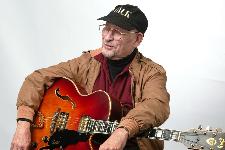
At any rate, Brengle became quite serious about jazz and spent a lot of time on the road. He toured through twenty-seven states and, as mentioned before, spent a lot of time playing in the top jazz clubs of Chicago and New York. Brengle was going back and forth between the Big Apple and Chicago, "but even then I kept landing here."
By 1976 he was back in Louisville permanently.
Raney came back for good in 1978. "New York got to him," Brengle said. "That's a rough place to work. We would listen to records and he would say, 'Who is that on guitar?' I'd say, 'Jimmy, that's you.' He wouldn't even remember having played it."
Winding Down And Giving Back
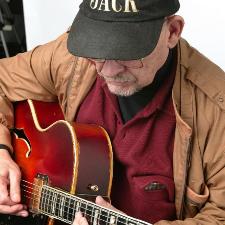
Even when he settled back in Louisville permanently, Brengle was playing six nights a week. Finally, he knew he'd had enough, so he started teaching as part of the Bizianes brothers' school. ("I'm the one who taught THEM, by the way," Brengle noted.)
"I decided I wanted to get out of the joints," he said. "I just got tired of it - the noise, the drunks and, well, you know. Hell, I'm a smoker, and I couldn't take the smoke."
Brengle began working on some of WFPL's jazz shows (you can find audio clips of Brengle's interview with Raney at www.classicjazzguitar.com). He also became active in the Louisville Jazz Society (formerly the Louisville Jazz Council), working with the late saxophonist Bobby Jones, plus co-founders Judy Hollis and Harold Maier, to help get the organization rolling in the early 1980s. About this time, Brengle began to teach jazz improvisation; he had a jazz lab and could teach improv for pretty much any instrument - even those he couldn't play.
"The thing that attracted me to teaching was ... all those things I picked up over the years, I felt like I should share those things," Brengle said. "I wanted to take the mystique out of music. Notes will not jump off a page and bite you. They're just notes. You CAN understand them."
He would end up teaching other Louisville musicians for nearly 20 years. "It was a crazy 20 years, but it was fun," he said.
Others recall Brengle's time in Louisville fondly. He was part of the backbone of the local jazz scene for many years. One of those is Scott Henderson, a professional jazz guitarist here who met Brengle as a 15-year-old beginner in the early 1970s.
"I was looking around for a teacher back then," Henderson said. "He wasn't really teaching then, but he told me to come hang out at the Captain's Quarters (where Brengle had a regular gig). He let me sit in and basically get free guitar lessons. I learned a lot from him."
Henderson later went to Boston to study at the Berklee School of Music, then moved to New York for a while. Much like Brengle, he would end up back in Louisville by the late 1980s.
"He's very important" to the Louisville jazz scene, Henderson said. "About twenty years ago, Jack sort of resurrected the Louisville Jazz Society. He was one of the original guys who got that going. He's just always been on the scene; he's played a lot, and he's spent a lifetime doing that sort of thing."
Bruce Morrow is one of Louisville's premier jazz drummers. He met Brengle in the early 1970s, having returned to town after playing professionally in Las Vegas and having spent a lot of time touring.
"He's always been involved in he jazz scene and things - things nobody hears about," Morrow said. "I didn't know a lot of the stuff he was doing behind the scenes. He never talked much about that. But he was definitely one of the main guys around here."
Morrow and Brengle have worked together on numerous projects, from jazz jams to commercial gigs. Morrow now plays in Dane's big band and also does a lot of theater gigs around the Louisville area. His story is much like Brengle's, which may explain why they see eye to eye. "I just got tired of the road," Morrow said. "I had my family and we just decided to come back, since we were from here. I came back with the intentions of not playing anymore. That lasted about two weeks. I've been playing ever since."
Morrow remembers Brengle's gig at Captain's Quarters with Danny Miles and Scotty MacLaury as a fun time, and cites it as evidence of Louisville's still-thriving jazz community.
"I really think we are a tight-knit group," he said. "When you get out on the road it can get pretty rough. I think it's a more relaxed scene around here. A lot of guys get together not so much to make money, but just because we love to play."
Asked about Brengle's best quality, he laughed and said, "Smoking. He really knows how to smoke. We've been trying to get him to quit."
On a more serious note, Morrow said of Brengle, "He's really sincere about the jazz scene, and really picking things apart. We would record a gig and he would take the tape and call me and say, 'What do you think about this?' or 'What do you think about what the sax section did here?' And if he's not playing good, he really beats up on himself. Jack really takes playing to heart."
"Let's get one thing straight," Brengle said. "I'm not an innovator, or I would be Bill Evans or Charlie Parker. I'm a copycat."
But he's always taken it seriously. "It's always been a challenge and it's always been fun when you improv and take a chance," Brengle said. "Someone once asked me, 'What do you think about when you play?' You don't have time to think. Sometimes you win, sometimes you lose. Sometimes it sounds good, and sometimes it sounds like shit. I've played some choruses I wish I'd never played."
Leslie Stewart has worked in Louisville public radio for more than 15 years and currently hosts a jazz show called "Criss Cross" Sunday mornings at 9 on WFPK. She learned of Brengle by seeing his name often when she first became part of the Louisville radio scene.
"His was definitely one of the main names when I started at the old FPL," Stewart said. "His name was on the jazz calendar ALL the time. I didn't get to hear him play that much then because I was working nights, but I've always had a lot or respect for Jack as player and as a person. He is one of Louisville's most tasteful players. He's not really flashy, but he's solid and he's tasteful. He has a knack for making things fit, playing the right notes at the right time."
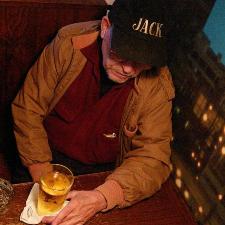
"I cannot give myself a whole lot of credit," Brengle said. "I've been privy to a whole lot of players that have given me - well, free knowledge I guess is the best way to put it."
Don't Change A Thing
The loss of Raney wasn't the only recent major loss to the jazz community. Late last year, WFPK's Phil Bailey died, leaving a huge hole in the Louisville jazz scene. Bailey and Brengle met in the early 1960s, and Brengle credits Bailey with being a driving force in the scene over the years.
"Phil knew more about us than we knew about ourselves," Brengle said. "I loved Phil Bailey."
This is true, much as Brengle loves Louisville and it loves him.
"Some of the best times I've ever had were in Louisville, Ky.," he said. "For the most part, I doubt if I would change a thing. And it was ALWAYS a challenge. I still love jazz and I will always love it."
